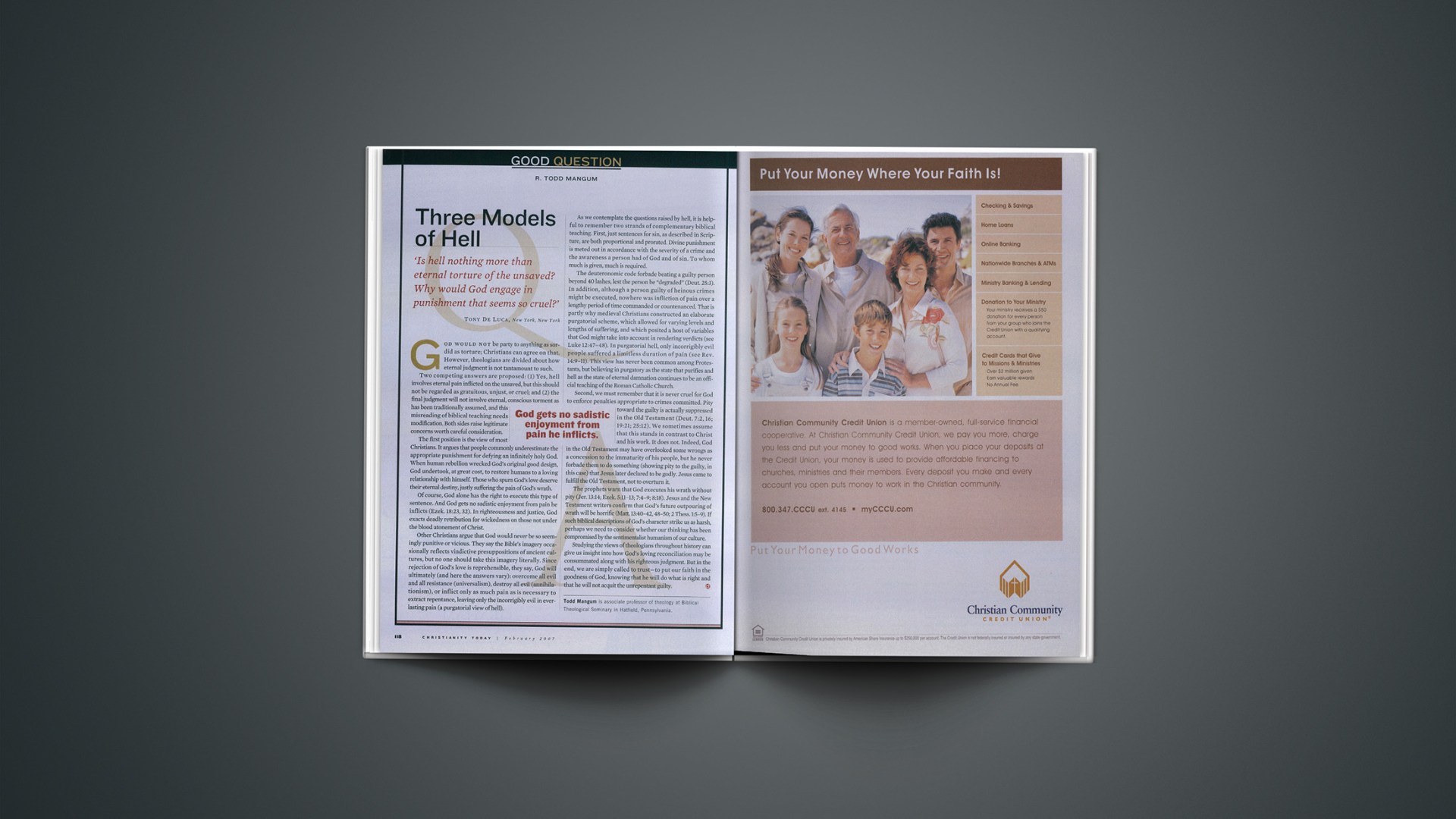God would not be party to anything as sordid as torture; Christians can agree on that. However, theologians are divided about how eternal judgment is not tantamount to such.
Two competing answers are proposed: (1) Yes, hell involves eternal pain inflicted on the unsaved, but this should not be regarded as gratuitous, unjust, or cruel; and (2) the final judgment will not involve eternal, conscious torment as has been traditionally assumed, and this misreading of biblical teaching needs modification. Both sides raise legitimate concerns worth careful consideration.
The first position is the view of most Christians. It argues that people commonly underestimate the appropriate punishment for defying an infinitely holy God. When human rebellion wrecked God's original good design, God undertook, at great cost, to restore humans to a loving relationship with himself. Those who spurn God's love deserve their eternal destiny, justly suffering the pain of God's wrath.
Of course, God alone has the right to execute this type of sentence. And God gets no sadistic enjoyment from pain he inflicts (Ezek. 18:23, 32). In righteousness and justice, God exacts deadly retribution for wickedness on those not under the blood atonement of Christ.
Other Christians argue that God would never be so seemingly punitive or vicious. They say the Bible's imagery occasionally reflects vindictive presuppositions of ancient cultures, but no one should take this imagery literally. Since rejection of God's love is reprehensible, they say, God will ultimately (and here the answers vary): overcome all evil and all resistance (universalism), destroy all evil (annihilationism), or inflict only as much pain as is necessary to extract repentance, leaving only the incorrigibly evil in everlasting pain (a purgatorial view of hell).
As we contemplate the questions raised by hell, it is helpful to remember two strands of complementary biblical teaching. First, just sentences for sin, as described in Scripture, are both proportional and prorated. Divine punishment is meted out in accordance with the severity of a crime and the awareness a person had of God and of sin. To whom much is given, much is required.
The deuteronomic code forbade beating a guilty person beyond 40 lashes, lest the person be "degraded" (Deut. 25:3). In addition, although a person guilty of heinous crimes might be executed, nowhere was infliction of pain over a lengthy period of time commanded or countenanced. That is partly why medieval Christians constructed an elaborate purgatorial scheme, which allowed for varying levels and lengths of suffering, and which posited a host of variables that God might take into account in rendering verdicts (see Luke 12:47-48). In purgatorial hell, only incorrigibly evil people suffered a limitless duration of pain (see Rev. 14:9-11). This view has never been common among Protestants, but believing in purgatory as the state that purifies and hell as the state of eternal damnation continues to be an official teaching of the Roman Catholic Church.
Second, we must remember that it is never cruel for God to enforce penalties appropriate to crimes committed. Pity toward the guilty is actually suppressed in the Old Testament (Deut. 7:2, 16; 19:21; 25:12). We sometimes assume that this stands in contrast to Christ and his work. It does not. Indeed, God in the Old Testament may have overlooked some wrongs as a concession to the immaturity of his people, but he never forbade them to do something (showing pity to the guilty, in this case) that Jesus later declared to be godly. Jesus came to fulfill the Old Testament, not to overturn it.
The prophets warn that God executes his wrath without pity (Jer. 13:14; Ezek. 5:11-13; 7:4-9; 8:18). Jesus and the New Testament writers confirm that God's future outpouring of wrath will be horrific (Matt. 13:40-42, 48-50; 2 Thess. 1:5-9). If such biblical descriptions of God's character strike us as harsh, perhaps we need to consider whether our thinking has been compromised by the sentimentalist humanism of our culture.
Studying the views of theologians throughout history can give us insight into how God's loving reconciliation may be consummated along with his righteous judgment. But in the end, we are simply called to trust—to put our faith in the goodness of God, knowing that he will do what is right and that he will not acquit the unrepentant guilty.
Todd Mangum is associate professor of theology at Biblical Theological Seminary in Hatfield, Pennsylvania.
Copyright © 2007 Christianity Today. Click for reprint information.
Related Elsewhere:
Other Good Questions about hell include:
Good Question: Hell's Final Enigma | Won't heaven's joy be spoiled by our awareness of unsaved loved ones in hell? (J. I. Packer, April 22, 2002)
Good Question: Did Jesus Really Descend to Hell? | In the Apostles' Creed, there is a statement about Jesus descending into hell. Did he literally go there? (February 7, 2000)
Directions: Can the Dead Be Converted? | A "choice" for Jesus is not like choosing a meal from a menu.(J. I. Packer, January 11, 1999)
Directions: Is Hell Forever? | Annihilationists anticipate one ultimate destiny for the wicked, an undifferentiated nonexistence.( October 5, 1998)
'Highlights: Brimstone for the Broadminded' discusses hell in the world of a loving God.
The October 2000 cover story, Undying Worm, Unquenchable Fire and sidebars Coming to Terms (Five key phrases in the hell debate) and Rightly Dividing the Hell Debate (Key advocates and writings) discussed views on the nature of hell.










